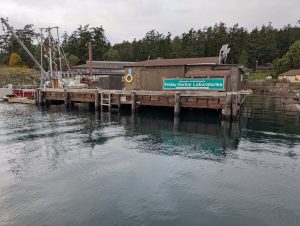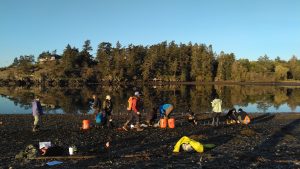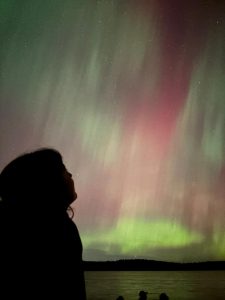FHL is a University of Washington satellite campus dedicated to education and research in the marine sciences. It has an international reputation for high quality courses held in a research-intensive atmosphere. In Spring, Autumn, and the occasional Winter FHL holds quarter-long programs: students enroll in a full load of 3-5 undergraduate courses or in a 15-credit research apprenticeship (the latter geared toward post-baccalaureate as well as upper level undergraduate students). In summer, we hold two, 5-week sessions (Summer A and Summer B); students can enroll in either or both. During a session, students take a single, 9-credit undergraduate or graduate course.
Use the menu on the right side of this page to explore course dates, student housing, dining, travel, and other aspects of living at FHL.
Location
Due to our remote location, students must live on the island and usually stay on the FHL campus (as do most course instructors): the living arrangement is convenient and efficient, with housing and full dining services offered a few steps away from classrooms, laboratories, and the shore. It is possible, though very time consuming and expensive, to travel off the island for an occasional weekend. You can read FHL Remote Learning Policy.
Time Commitment & Presence
Courses and research apprenticeships require a full-time commitment, normally all day Monday-Friday in Spring, Winter, and Autumn Quarters; Monday-Friday plus Saturday mornings for summer courses. Students are expected to attend in person any and all classes, trips to the field, and/or lab work.
For absences, it is the responsibility of the student to inform the instructor in advance (or as close to the in-person activity as possible in the case of an unexpected absence), and to request appropriate make-up work as per policies established in the syllabus. It is the prerogative of the instructor to decide if make-up work is possible or how the assignment or course grading might be modified to accommodate the missed work. For chronic absences, the student may want to contact their academic adviser to consider a hardship withdrawal (known as a Registrar Drop).
Student Experience
Click through the drop down menus below to hear from students’ personal experiences in various programs.
Tatiana Egbert: Autumn Marine Studies 2024
For the last full quarter of my undergraduate degree in biology, I attended the Autumn Marine Studies 2024 program at Friday Harbor Laboratories. At the time of my application, I was a UW Bothell student looking for an immersive field-study opportunity that would allow me to explore my particular interest in marine biology. This essay serves as a reflection as I look back at all the invaluable experiences I gathered during my time at FHL.

Move-in day on San Juan Island was quite a unique experience. I got my car to the island via the Washington State Ferries from Anacortes, loaded with all the gear and sentimentals I would need for my two-and-a-half-month stay. Getting off the ferry, I drove a short six minutes to FHL and explored the campus with my family. The first place I remember taking them was to the dock by the harbor, where I ended up spending many mornings watching the sunrise and many evenings unwinding with my new friends. Overlooking the FHL dock is the library in the Fernald building. This study space was incredible because during homework breaks, I would take out my binoculars and observe all the wildlife that passed through the harbor, including cormorants, Steller sea lions, and river otters. Another place on campus I frequently used for collaboration and getting work done was the dining hall, a common space for all members of the FHL community to eat, socialize, and relax.
The AMS 2024 program requires on-campus living, so I opted to live in one of the private huts where I was tucked away in a forested corner of campus. I was so happy to be surrounded by nature all the time and to have the opportunity to look up and see the stars right from my porch on a clear night. Attending class at a marine biology field station was an academic experience like no other, where the Salish Sea was our classroom and the labs in which we did research were within walking distance from where we slept. That being said, the quarter I spent at FHL required me to be completely immersed in my academic life. I spent those two-and-a-half months giving my all to my class projects and assignments. Our quarter consisted of regularly scheduled class lectures, group project meetings, independent and collaborative research with our mentors, and many hours in the field collecting data and making observations. Some of our field days would be on campus in the labs, and others would be down at the dock or at Jackson Beach. Some of the fieldwork we participated in included snorkeling in Argyle Lagoon and trawling on the Kittiwake to estimate biodiversity and assess the dynamics of marine ecosystems. At the mercy of the tides, our field day excursions were early in the morning or late at night. Our academic projects ranged from whole-class research projects to smaller group research projects designed and conducted by us with guidance from our professors. We also worked in small groups with researchers at FHL, collaborating on their ongoing projects as they matched our interests. Throughout the quarter, we had the amazing opportunity to participate in the FHL Science Outreach Program, helping to inspire first-grade students on San Juan Island to become interested in the scientific method through curiosity. It was a privilege to share our passion with a group of young scientists, surrounded by such an exceptional and important marine ecosystem.

FHL is located in an ideal location to study the marine environment of the Salish Sea. Always being outdoors, I became very familiar with the flora and fauna that call this archipelago home. As a class, we spent most of our time exploring our surrounding environment on the biological preserve of FHL, regardless of the conditions. We always had to be geared up and ready to get a little dirty – and very wet. During our stay at FHL, we considered ourselves to be natural historians, contributing to sightings on iNaturalist and familiarizing ourselves with the biology of the island. We also considered ourselves stewards of the land and waters, always doing our part as guests on the island to keep it beautiful. Even when we weren’t in class, my classmates and I were constantly curious to explore our environment through tide pooling, whale watching from the FHL shore, and observing fish off the dock at night with an LED green light. During my time at FHL, we were even lucky enough to experience the magical phenomenon of the northern lights right from our campus.

When we weren’t in class or working on our research projects, we kept busy exploring the island with each other. It was a goal of mine to make the most of my time on the island, and in doing so, I tried to spend as little time in my room as possible. I usually consider myself an introvert, but the amazing opportunities that presented themselves on San Juan Island called to me and got me outdoors. My classmates would frequently check out the FHL rowboats to explore the marine environment and row into town to check out places like the weekend farmers market and the Whale Museum. We also carpooled to explore other parts of the island such as South Beach and Lime Kiln State Park, where we would watch wildlife from shore and go diving. Some of my fondest memories with my classmates include our relaxing beach days, our daring cold plunges, and chasing wind storms at Cattle Point. Being an islander gave me a new sense of adventure that I will carry forward. As a class, we also introduced each other to our passions outside of science which included participating in student-organized Dungeons and Dragons campaigns and hosting movie nights. So many of our weekend nights were spent in the dining hall playing board games, singing karaoke, and getting to know each other as friends. All of our shared experiences as a class at FHL drew us close together. As a small class of less than 20 students, we got to know each other very well and learned more about marine biology through each other’s specific interests. Also, as a small class, we were able to work very closely with our professors and mentors. We had frequent meetings with our professors and were able to ask many questions and have valuable conversations with them about their professional histories in science and what our goals and ambitions for the future were. Through FHL, I was able to vastly expand my scientific community and make lifelong friends with people who share the same passions as me.
I am forever grateful for my time as a student at Friday Harbor Labs during Autumn 2024. I have gained so many indispensable skills, met so many wonderful people, and had the most fun I’ve ever had as a biology student during my time at UW.

Adam Nguyen: Spring Marine Studies 2021